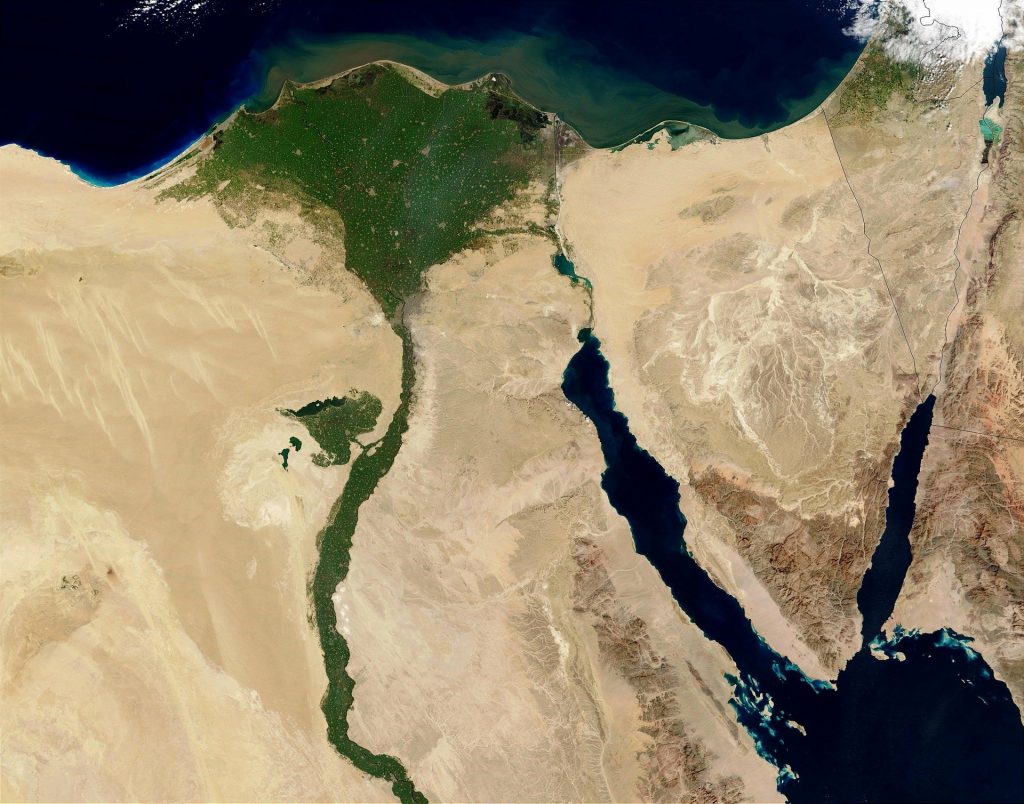
(4-5 Minute Read)
Exodus 6:2 – 9:35
As the Torah parashah, or portion, of Va’Era begins, the Most High spoke to Moses, reiterating that He had appeared to Abraham, Isaac, and Jacob and established a covenant with them. The Almighty stated that He had heard the moaning of the Israelites. He would free them through extraordinary acts and make them His own people, bringing them to the land that He had sworn to give Abraham, Isaac, and Jacob in His covenant with them. Moses relayed this communication to the Israelites, but they refused to believe him.
The Eternal One instructed Moses to again demand that Pharaoh let the Israelites go. Moses protested, complaining that if the Israelites didn’t listen to him, then surely Pharaoh would ignore him and his “impeded speech.” The Most High spoke further to Moses and Aaron about the deliverance of the Israelites from Egypt.
The heads of certain Israelite clans are documented. Amram of the clans of Levi married Jochebed and had two sons, Moses and Aaron. Aaron married Elisheba, the brother of Nahshon, the son of Amminadab. Aaron and Elisheba had four sons named Nadab, Abihu, Eleazar, and Ithamar.
The Almighty replied that Moses was to speak to Pharaoh as His representative along with Aaron, demanding to allow the Israelites to depart. But the Most High would harden Pharaoh’s heart in order to perform great signs, marvels, and extraordinary chastisements against Egypt. Moses and Aaron did so, and were 80 and 83 years old respectively at that time.
As commanded, Aaron threw his rod onto the ground and it became a serpent as a sign to Pharaoh. At Pharaoh’s request, the Egyptian sorcerers did the same with their own rods, but Aaron’s rod swallowed up their own. Nevertheless Pharaoh hardened his heart and ignored Moses and Aaron, just as the Most High had predicted.
The Eternal One commanded Moses to approach Pharaoh in the morning as he entered the water of the Nile River. Moses was to declare to Pharaoh that since he refused to let the Israelites go, the Almighty would turn the water of the Nile into blood. All the fish would die, and the river would become foul and undrinkable.
At the Most High’s instruction, Aaron held out his arm and rod over Egypt. All the water of the Nile and other bodies of water — even in jugs and containers — turned to blood. But when the Egyptian sorcerers replicated the wonder, Pharaoh hardened his heart. All the Egyptians dug round about the Nile for drinking water.
Seven days later, the Almighty told Moses to go to Pharaoh, telling him that if he did not let the Israelites go, then the whole country would be plagued with swarms of frogs.

The Almighty informed Moses that Aaron should hold his arm and rod over the rivers and other bodies of water and bring up frogs over all the land of Egypt. He did so, but so did the Egyptian sorcerers.
Pharaoh summoned Moses and Aaron to plead with the Most High to remove the frogs, and he would let the Hebrew people leave to make sacrifices to the Almighty. Moses told Pharaoh that he could choose when the plague of frogs would end to show that there is none like the Most High. Pharaoh replied, “Tomorrow.” Moses declared that the frogs would only remain in the Nile starting the next day.
The Almighty did as Moses had requested, and the frogs died. The Egyptians piled the frogs in foul-smelling heaps. Seeing there was relief, Pharaoh became stubborn and ignored them, just as the Most High had said.
Aaron was then commanded by the Almighty through Moses to strike the dust of the ground and lice would appear. This time the sorcerers could not duplicate the wonder, admitting that this was the work of the Almighty. The lice remained on both human and animal, but Pharaoh’s heart again was hardened, as the Eternal One had spoken.
The Eternal One again instructed Moses to approach Pharaoh early in the morning as he came out to the water. He was to order Pharaoh to let the Hebrews go that they may worship the Master of the Universe. If not, swarms of insects would infest the entire land except for Goshen where the Israelites lived, making a distinction between the people of the Most High and the Egyptians. The Almighty did so, and the land of Egypt was ruined from the insects.
Pharaoh summoned Moses and Aaron, telling them to allow the people to sacrifice to the Almighty, but within the land of Egypt. Moses countered that they were required to sacrifice sacred animals (e.g. sheep*) to the Most High, and the Egyptians would stone them for blaspheming their “deities.”* Pharaoh conceded that he would let the Hebrews go into the wilderness, but not very far. Moses agreed to plead with the Almighty to remove the insects, but he urged Pharaoh to keep his word and not be deceitful.
The Most High heeded Moses’ request, and not a single insect remained. But Pharaoh became stubborn this time as well, and would not let the Israelites go.
The Almighty told Moses to go to Pharaoh and warn him that a severe pestilence would infect and kill all Egyptian cattle and livestock in the fields the next day if he didn’t let the Hebrews go. But the Most High would make a distinction between the livestock of Israel and of Egypt.
The Eternal One did so the next day. Pharaoh inquired and discovered that no livestock of the Israelites had died. Yet he remained stubborn and refused to let the people go.
The Master of the Universe told Moses and Aaron to throw handfuls of soot and ash from the ovens into the air in the sight of Pharaoh. It would become fine particles over all Egypt and cause sickness — inflammation and boils — on all humans and animals throughout Egypt. Moses and Aaron did so, and the sorcerers could not confront Moses because of the sickness that afflicted them like all other Egyptians. But the Almighty stiffened Pharaoh’s heart, and he ignored them, just as the Most High had said.
The Eternal One told Moses to present himself to Moses early in the morning and tell Pharaoh to let His people go to worship Him, or more plagues would come. The Most High noted that He could have destroyed Pharaoh and all the Egyptians already, but they were spared for the purpose of displaying the power of the Almighty to the entire world. The next day a very heavy hail would fall, and Pharaoh and his courtiers were told to bring their servants and livestock inside, or else they would die. Those among the courtiers and Egyptians who feared the Most High did so; those who had no regard for the word of the Almighty left them out in the field.
The Most High instructed Moses to hold his arm toward the sky that hail would fall upon all the people, animals, trees, and vegetation of Egypt. Thunder and hail mingled with fire* rained down upon all Egypt, the likes of which had never occurred in Egyptian history, killing all who remained outdoors. Only in Goshen where the Israelites lived was there no hail.
Pharaoh sent for Moses and Aaron and told them that he and his people were wrong and the Most High was right. He asked them to plead with the Almighty for the hail to end, and he would let the people go. Moses indicated he would spread his hands towards the Almighty and the hail would cease, but that he was aware that even now Pharaoh and his courtiers did not fear the Eternal One.
Early crops like flax and barley had been ruined, but later crops like wheat were not damaged. When the hail ceased, Pharaoh and his courtiers became stubborn and refused to let the Hebrews go, as the Almighty foretold.

One question that many chachamim, rabbinical sages of blessed memory, have proposed relates to the stubbornness of Pharaoh. In some passages, we read that the Almighty “hardened Pharaoh’s heart.” In other portions of the text, it is said that Pharaoh hardened his own heart himself. Two significant questions thereby arise. First, what is the difference ultimately between the Most High hardening Pharaoh’s heart and and Pharaoh hardening his own heart? Second, does the Almighty really take action to prevent an individual or even an entire nation from doing teshuvah, from achieving proper repentance?
The famed Sephardi scholar and financier, Rabbi Don Yitzchak Abravanel, discussed this topic at length. Ultimately he emphasized that there were several approaches to this issue, three in particular.
First, Abravanel noted that while teshuvah is required for our souls and can mitigate the consequences of certain sins, the punishment of other sins, generally speaking, cannot be mitigated even by teshuvah, true repentance. For instance, if an individual commits the sin of idolatry, proper teshuvah could reduce or remove impending judgment. However, no matter how much repentance a murderer may engage in, he or she must nevertheless be prosecuted fully (and executed, if the parameters apply). Similarly, even a repentant thief must repay the stolen amount and the prescribed penalty. In this context, Pharaoh and the Egyptians had engaged in such sins as murder (especially of the Jewish male children) and theft (such as enforced slave labor). Thus, the hardening of Pharaoh’s heart by the Eternal One is therefore acceptable and appropriate to facilitate punishment because even teshuvah could not mitigate that magnitude of pending consequences.
Second, Abravanel discusses the parameters of repentance for non-Jewish nations. In short, the premise is that there can be no true teshuvah for non-Jews while simultaneously maintaining an open hostility towards or otherwise mistreating the Jewish people. Since the Jewish people are representative of the Torah and even the Almighty Himself (although we often don’t live up to that standard), then the supposed repentance of non-Jews who do not subscribe to proper respect for the Jews as the people of the Most High will be unstable and unlasting. In other words, as long as Pharaoh and the Egyptians sought to oppress and enslave the Hebrews, no forms of “repentance” would be of any permanent value; their “repentance” was doomed to fail rapidly before it even began. Accordingly, almost immediately after Pharaoh expressed remorse, he always changed his mind and refused to let the Jewish people, especially when the Almighty showed mercy. The supposed “repentance” of Pharaoh didn’t last more than a few hours, or maybe even minutes.
Third, and most likely and pertinent according to Rabbi Abravanel, the terminology of the Torah indicates that this hardening was directly related to the dynamics of the Ten Plagues of Divine origin. All of the plagues were sent by the Almighty, and He knew in doing so that Pharaoh would harden his heart in response. Thus, in a way, both the Most High and Pharaoh were involved in the hardening process. First the Eternal One sent the plague (and often removed it), which ultimately caused the hardened heart. And then Pharaoh of his own volition hardened his heart. Therefore, depending on the angle of view, both the Most High and Pharaoh could be said to have “hardened the heart.”
Elaborating a little bit more on Abravanel’s third and preferred premise, some have suggested that the Torah is alluding to the complex methodology in which the Holy One, Blessed be He, controls the entire universe. In a nutshell, the Almighty coordinates all of the events of the universe, even the actions of the unrighteous, to work together to achieve his will. For instance, the Most High clearly didn’t want Joseph to be sold into slavery by his brothers, and He certainly did force the brothers to do so. However, understanding what the brothers would do of their own volition, the Eternal One prepared the circumstances in Egypt that Joseph would have a challenging life followed by an unexpected promotion to viceroy of Egypt. The Eternal One doesn’t make the wicked perform acts of evil; He anticipates their actions and preemptively prepares accordingly. In this case, Pharaoh was always responsible for his own actions and stubborn rebellion against the Holy One, Blessed be He. However, in some cases the Most High “engineered” the circumstances to ensure that Pharaoh continued to make the wrong choices, because great punishments had been decreed and were pending for him and the Egyptians. The Infinite One also sought to display to the entire world that He was, in fact, the Almighty Creator. Pharaoh always made his own decisions as a matter of free will, but the Almighty worked in a way that would prompt him to harden his own heart. For instance, even the displays of mercy after each plague might have induced Pharaoh to be rebelliously stubborn and change his mind. The merciful compassion of the Almighty might have directly caused the hardening of Pharaoh’s heart, but obviously Pharaoh was responsible for his own poor response. We cannot fault the Most High for showing compassion according to His will, even if He was aware that such mercy would embolden Pharaoh to perform more evil of his own volition.May the Holy One, Blessed be He, assist us to evaluate our lives on an ongoing basis and maintain proper levels of teshuvah and repentance, and therefore improve the spiritual quality of our lives. And may we ever seek to be obedient to the Holy One, Blessed be He, and His Torah, no matter what circumstances or situations we are faced with.


